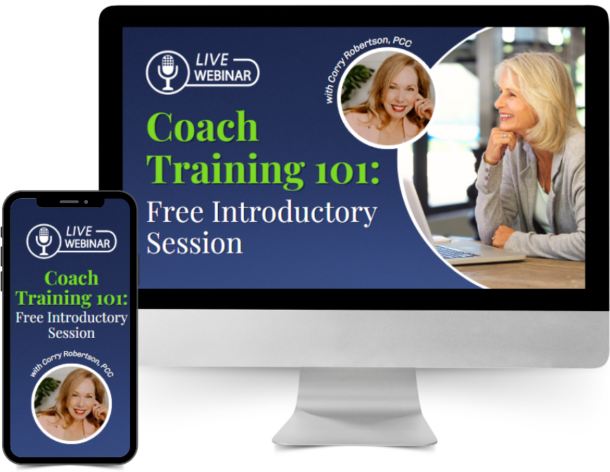It’s clear that AI, or artificial intelligence, is becoming increasingly prevalent across various industries and aspects of our daily lives. When we think of AI, we often associate it with innovation and the future, as it represents a type of advancement that mirrors human capabilities. While we’re accustomed to seeing AI in movies or reading about it in sci-fi novels, it’s no longer just fiction – it’s a reality we’re experiencing firsthand.
But does this technological shift impact the coaching landscape?
With the emergence of artificial intelligence (AI), coaches have the potential for new tools to elevate their services and expand their reach. AI integration offers promises of efficiency and effectiveness in coaching practices, from providing to streamlining processes like scheduling sessions and habit tracking, similar to apps where people log what they eat and when.
Some clients may want an AI-generated summary of the session to save them from taking notes while they’re being coached.
However, the question arises: Can AI ever replace the human connection and personal growth that coaches offer? Let’s dive into this discussion.

Understanding AI in Coaching
Understanding AI in coaching begins with grasping its definition and diverse applications. Artificial Intelligence (AI) refers to computer systems capable of performing tasks that typically require human intelligence. These tasks range from recognizing patterns and solving problems to understanding language and making decisions.
Now, imagine AI stepping into the coaching arena. Some may think that AI would be like having a smart digital helper with powerful analyzing skills. It could study large amounts of data to find patterns in clients’ actions, preferences, and growth, allowing you to tailor coaching sessions and strategies based on each individual’s unique needs and goals. Mind-blowing, right?
The fundamental misunderstanding with this vision is this is not at all what coaching is about.
A coach does not gather data or analyze their clients – that is not the purpose of being coached.

Coaches have actual intelligence, so we don’t need artificial intelligence.
The coaching approach to a conversation with a client is never about “strategically tailoring” their sessions. It IS always about being present with the client and adapting to them in the moment. It is common for clients never to bring the same topic to a coaching session twice. What the client wants to talk about and why will vary from session to session
A comment I hear often these days is, “AI is changing the coaching landscape in profound ways.” This is true in terms of the administrative aspect of practice management. Coaches now have access to tools that can streamline administrative tasks, such as scheduling appointments and organizing client information, such as the coaching agreement and contact details.
However, it must be understood that professional coaches do not keep files on their clients other than logging the time and date of the session. It comes as a surprise to many students new to coach training but one of the first habits that I insist they break is that of taking notes during the session.
This is for two reasons. Note-taking interferes with the coach’s number 1 role, which is to listen. Additionally, if anyone takes notes, it’s the client so that they can capture the reflections that are meaningful to them.
Coaching Is Not Tracking Data
I have read that AI enhances the coaching process itself and that It can generate insights based on data analysis, helping you identify areas for improvement and track your clients’ progress more accurately. Those who agree with this statement are missing the point of coaching completely.
The coach does not tap into ‘data.’ The coach and client partner in a thought-provoking conversation that includes empathy and intuition in a way that can only be done through professional coaching and that can only come from human-to-human connection.
Coaches do not track their clients’ progress; the client does that. The coach does not suggest areas of improvement. Coaching evokes new awareness and unlocks elusive insight, and from there, the client generates areas of improvement or the need for change.
Managing progress and accountability is also in the hands of the client, but let’s not assume that progress is always about scratching things off a list, achieving goals, or pinning down measurable results. Human transformation is oftentimes much more elusive yet more meaningful and impactful than what shows up on a goal planner or to-do list.

Can AI Replace Coaches?
As technology progresses and new solutions emerge, it’s natural to wonder if humans might be replaced. Many fear that AI could take over the role of coaches entirely. But, from where I stand, AI will never be able to replace professional coaches, especially when you understand what coaching actually is.
AI may be incredibly smart, but it lacks one thing: the human being. While AI can undoubtedly crunch numbers, analyze data, and even chat with you like a professional, it can’t empathize, connect, or truly understand you in a way a human coach can.
Think about it this way: AI operates based on algorithms and programming, while coaches operate based on professional training, empathy, intuition, and years of experience. They can read between the lines, pick up on subtle cues, energy shifts, and emotional shifts, and adapt their approach from moment to moment to fit your unique needs and personality as it shows up in the session. The same person shows up differently, with different moods, energy levels, frames of mind, needs, and desired outcomes at each session. It is not linear.
Yes, AI can provide resources based on the criteria you give it, just like a Google search can. You can use it to track your caloric intake and burn, but it can’t provide the personalized partnership and support that comes from a genuine human connection. Coaching requires building mutual trust and asking powerful questions that evoke new awareness.
So, while AI may have its place in the coaching world as a helpful admin tool, it can never replace the heart and soul that human coaches bring to the table. After all, nothing beats the power of a caring, compassionate coach who’s dedicated to helping you become the best version of yourself.
Of course, professional coaching is not a catch-all term for helping people achieve their goals. I suppose if it were that basic, AI could do it. But becoming a coach takes training and devotion to honing coaching skills. No training, no coaching. AI? Not coaching.

Why Should Coaches Cope and Adapt to AI?
Although AI can’t replace the unique qualities and insights that human coaches offer, it definitely impacts coaching per se.
I opened this discussion to our coaching community, and one of the things that was pointed out was how AI can most likely impact transactional coaching. That’s why, as ICF Master Certified Coach and Coach Trainer Bryan Hart put it, “Coaches should build [their] MCC coaching skills to expand their range, as the more at-risk portion of the field may see some constriction.”
In essence, though AI will never be able to replace coaching – coaches do need to keep up with these changes to remain relevant and effective in helping clients.
I agree with Bryan 100%. Masterful coaching means being able to truly recognize when a person has a new level of awareness that is ready to be explored. Then, coaches look at how can that new awareness be allowed to come forth through the coaching skill of reflective inquiry.
Masterful coaching also means knowing when NOT to attempt to take a client to a depth they are not ready or willing to go to. One day, the client may want to go deep, and the next, they may want to keep things on a surface level. The more masterful the coach, the better they will be at gracefully, seamlessly, and intuitively knowing how to coach that person at that moment on whatever topic they brought to the table that day. AI will never lead the way in that regard, only your coaching skills will.

The Power Of AI For Convenience – Not Unique Human Challenges
Coaches have human brains which are pretty darn intelligent. Because the listening skills of a coach are powerful, we remember conversations, and we can support the client in making connections and identifying patterns. Sorry, AI, but I don’t need you for that. Thanks to my actual intelligence, I don’t need artificial intelligence!
By embracing AI, we can delegate some admin tasks to tech and redirect our energy into learning and practicing our coaching skills. AI tools can help streamline some administrative tasks, but incorporating AI into coaching will in no way replace human interaction — what it can help us with is leveraging the power of technology for convenience.
As Hart also explains, AI in coaching boils down to “what we believe is best and what the market would respond to.” AI can be a helpful tool that provides “Google-like” solutions for simpler challenges—but never to the extent of helping clients resolve complex and unique human hurdles.
Adapting to AI is a way for us, coaches, to future-proof our businesses and stay competitive in a rapidly changing landscape. The only constant in life is change, and the best way to navigate it is to grow and evolve along with it.
By cherry-picking the best of AI into our coaching practice, we position ourselves for success in the digital age while continuing to provide the personalized partnership and support that our clients value.

How To Incorporate AI in Your Coaching Practice
While AI is widely adopted across various industries, many coaches may still feel uncertain about integrating it into their practice. However, incorporating AI doesn’t have to be daunting because so little of it applies to us. Here are some straightforward ways to seamlessly integrate it into your coaching approach.
Stay Informed: Keep up with the latest developments in AI technology and how it can benefit coaching practices. Stay curious and explore new AI tools and platforms.
Start Small: Begin by incorporating simple AI tools into your coaching practice, such as scheduling assistance or writing tools to proofread your written correspondence, start small and gradually expand your use of AI as you discover tools that make sense.
I use it for scheduling and proofreading. Some clients may wish for the AI-generated notes that some platforms can provide however, for obvious privacy and confidentiality reasons, most clients do not want their sessions recorded. Sometimes, I use AI tools to help me develop snappy titles for course content when I’m feeling stuck. That being said, machine-led proofreading is not perfect; I do still have to proofread, and AI notetaking does not always capture what was actually said.
Beware of Training: Beware of training programs and resources that try to get you to integrate AI tools into your coaching practice. Too many AI vendors do not know what professional coaching is, so their solutions do not support the role of the coach, coaching ethics, or coaching standards.
Personalize Your Approach: You can also use AI to personalize your coaching approach, such as developing goal setters or habit trackers based on individual client needs and goals. Some clients like to fill those out and keep them up to date so that they can reflect on progress. Explore AI-powered tools that offer customization options and adapt your strategies accordingly. That being said, the vast majority of my clients are not at all interested in these tools because their conversations with me are profound, life-affirming, and transformational, not transactional, like to-do lists and checking things off them. Honestly, who needs a professional coach to read over their to-do list with them?
Experiment and Iterate: Don’t be afraid to experiment with different AI tools and techniques to see what works best for you and your clients. Be open to feedback and iterate on your approach as you learn.
Human-Centered is here to stay: Remember that AI is a tool to enhance, not replace, the human touch in coaching. The focus of coaching is on empathy, understanding, and building meaningful connections with your clients. While AI may be cool for some or nice to have to expedite some admin tasks, it is by no means necessary for coaching. All you need to offer great coaching is you and your coaching skills, a great client and a good place to talk.

A Bright Future Ahead for Coaching
AI technology is expected to continue in the years ahead; however, Professional Coaching will not undergo a significant transformation because of it. Actually, coaching is one of the professionals that is AI-proof.
With the exception of handling routine administrative tasks AI has no impact on the coaching conversation, coaching outcomes for clients or the way coaches work. Anyone who thinks otherwise does not understand professional coaching.
“Know all the theories, master all the techniques, but as you touch a human soul, be just another human soul”.
~ Carl Jung
How about you? What do you think about integrating AI into coaching practices? Let me know in the comments!





0 Comments